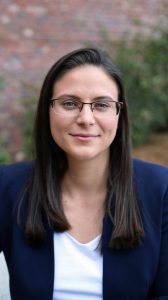OXFORD, Miss. – A doctoral student in the University of Mississippi Department of English has been chosen for a prestigious national award to assist in completing her dissertation.
Allison M. Serraes, of West Palm Beach, Florida, is among 67 students named 2019 Mellon/American Council of Learned Societies Dissertation Completion Fellows. The fellows, who hail from 42 universities across the country, were selected from a pool of more than 1,000 applicants through multiple stages of peer review.
The fellowship provides a $30,000 stipend and up to $8,000 in research funds and university fees to advanced graduate students in their final year of dissertation writing. The program, which is made possible by a grant from the Andrew W. Mellon Foundation, also includes a faculty-led academic job market seminar, hosted by ACLS, to further prepare fellows for their postgraduate careers.
“Receiving this fellowship is an incredible honor and is especially significant for such an interdisciplinary project,” said Serraes, whose dissertation topic is “Carceral Matrix: Black Women’s Writing in Response to Mass Incarceration, 1963-2017.”
Since 2017, Serraes has served as a graduate teaching assistant in the university’s Prison-to-College Pipeline Program, an instructional collaboration that helps incarcerated men and women earn college credit hours.
“I plan to use the fellowship’s funding to underwrite the time it will take to study and synthesize perspectives from African American literary studies, gender studies, critical prison studies and studies in the history of the carceral state,” Serraes said. “The fellowship will also make it possible for me to conduct relevant research travel and to present my work in a variety of scholarly spaces.”
The project reveals how black women writers since the 1960s have provided complex models for exploring incarceration and confinement through black female characters whose futures depend on their converging struggles for freedom of expression and reproductive autonomy. Serraes’ study examines the works of authors Gayl Jones, Alice Walker, Suzan-Lori Parks and Eve Ewing.
“I was especially drawn to this topic because I think we – as a general public – are missing something in our overall understanding of mass incarceration and the ways it affects not only those who are incarcerated, but all of us as community members and as a nation,” Serraes said. “My dissertation takes a closer look at how black women writers have questioned, critiqued and resisted the progression of surveillance, violence and imprisonment, both leading up to and throughout the peak years of U.S. mass incarceration.
“In highlighting their work, it demands we look intentionally at the process of incarceration and interrogate why we incarcerate so many people and what the social, political and ethical implications are.”
Serraes shared how she came to her choice of research for her dissertation.
“I developed my dissertation proposal after taking a seminar with Dr. Patrick Alexander (associate professor of English and African American studies) on writings from radical imprisoned intellectuals about the contemporary U.S. prison system,” she said. “This seminar, along with my work as a teaching assistant in the PTCPP – co-founded by Dr. Alexander and Dr. Otis Pickett – got me thinking more critically about the social and political ramifications of mass incarceration.”
Simultaneously, in Serraes’ own research on black feminist literature and critical prison studies, she noticed that several black women writers and activists in the late 20th and early 21st centuries were theorizing the complicated and intersecting ways surveillance, violence and incarceration affect not just individuals, but entire communities through confinement, reproductive control and economic injustice.
Serraes’ honor attests to the quality of students enrolled and the rigor of instruction offered within the department, Alexander said.
“Her receiving such a high honor at this point in her academic career has been especially amazing for me to witness,” said Alexander, who has gotten to know Serraes as a student and graduate teaching assistant and who serves on her dissertation committee.
“Allison has been writing a splendid, genuinely interdisciplinary dissertation – one that unites the fields of African American literary studies and critical prison studies – on black women writers’ sophisticated literary responses to mass incarceration, confinement, reproductive control and economic injustice.”
Serraes received her bachelor’s and master’s degrees in English from Florida Gulf Coast University, in 2012 and 2014, respectively.
In its 13th year, the fellowship program offers promising graduate students a year of funding so that they can focus attention on completing projects that form the foundations of their scholarly careers.
For more about the Mellon/ACLS DCF Progam, visit https://www.acls.org/Recent-Awardees/Mellon-ACLS-Dissertation-Completion-Fellows.
